Description
Clinical Pharmacology:
Administration of a single dose of miconazole nitrate vaginal suppositories (100 mg) to healthy subjects resulted in total recovery from the urine and feces of a 85% (0.43%) of the administered dose
Miconazole nitrate exhibits fungicidal activity in vitro against species of genus Candida. The pharmacological mode of action is unkown.
Following intravaginal administration of miconazole nitrate, small amounts are absorbed.Animal studies indicate that the drug crossed the placenta and doses above those used in humans result in embryo and fetotoxicity( 80mg/Kg orally), although this has not been reported in human subjects.
Indication and usage:
Monicure vaginal suppositories are indicated for local treatment of vulvovaginal candidiasis (moniliasis). Effectivenss in pregnancy and in diabetic patients has not been established. As MONICURE is effective only for candidal vulvovaginitis, the diagnosis should be confirmed by KOH smear and/or culture. Other pathogens commonly associated with vulvovaginitis (Trichomonas and Haemophilus vaginalis [Gardnerella]) should be ruled out by appropriate laboratory methods.
Contraindications:
Patients with known hypersensitivity to this drug.
precautions:
General:
Discontinue the drug if sensitization or irritation is reported during use. The base of the suppository may interact with certain latex products such that used for contraception diaphragms, thus concurrent use is not recommended.
Laboratory tests:
If there is a lack of response to Monicure vaginal suppositories, appropriate microbiological studies (Standard KOH smear and/or cultures) should be repeated to confirm the diagnosis and rule out other pathogens.
Carcinogenesis, mutagenesis and impaired fertility:
Long-term animal studies to determine carcinogenic and mutagenic potentials have not been performed.
Fertility:
Intravaginal administration did not produce the effects (prolonged gestation, fetal and embryo toxicity, dystacia) after oral doses at and above 80mg/kg caused by orally administered doses in animals.
Pregnancy:
Since imidazoles are absorbed in small amounts from the human vagina, they should not be used in the first trimester of pregnancy unless the physician considers it essential to the welfare of the patient.
There was no adverse effects or complications attributable to miconazole nitrate therapy in infants born to women treated with the suppositories for up to 14 days.
Nursing mothers:
It is not known whether miconazole nitrate is excreted in human milk, yet caution should be exercised when it is administered to a nursing mother.
Adverse REACTIONS:
Women treated with vaginal miconazole nitrate might experience vulvovaginal burning, itching or irritation complaints of cramping and headaches were also reported. Other complaints (hives, skin rash) occurred with fewer incidences.
Overdose:
Overdosage of miconazole nitrate in human has not been reported to date.
dosage and application:
One suppository (miconazole nitrate, 200 mg) is inserted intravaginally once daily at bedtime for three consecutive days. Before prescribing another course of therapy, the diagnosis should be reconfirmed by smears and/or cultures to rule out other pathogens.
How supplied:
Monicure vaginal suppositories (Miconazole nitrate, 200 mg) are available as 2.6 gm, white to off white suppositories in package of six.
Pack:
Carton box containing one PVC/LDPE blister of 6 suppositories.
STORAGE:
Keep at a temperature not exceeding 30C.
Keep out of reach of children.
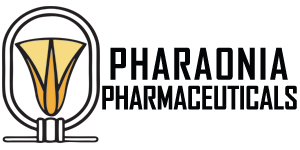

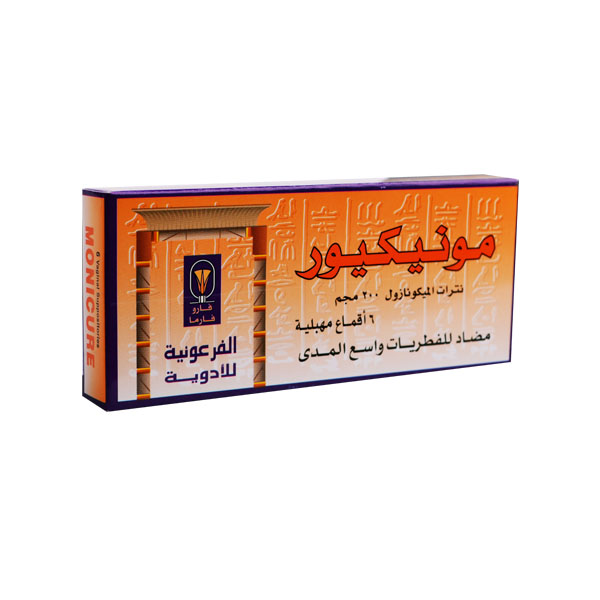

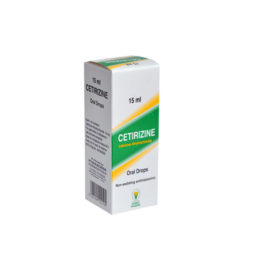
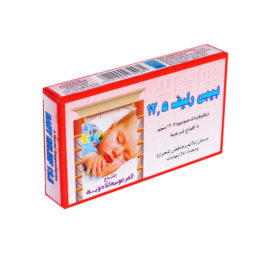
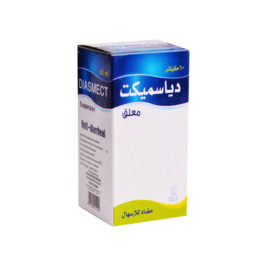
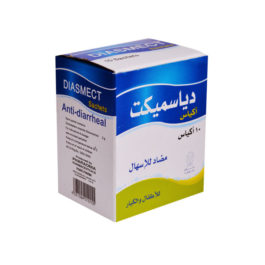
Reviews
There are no reviews yet.